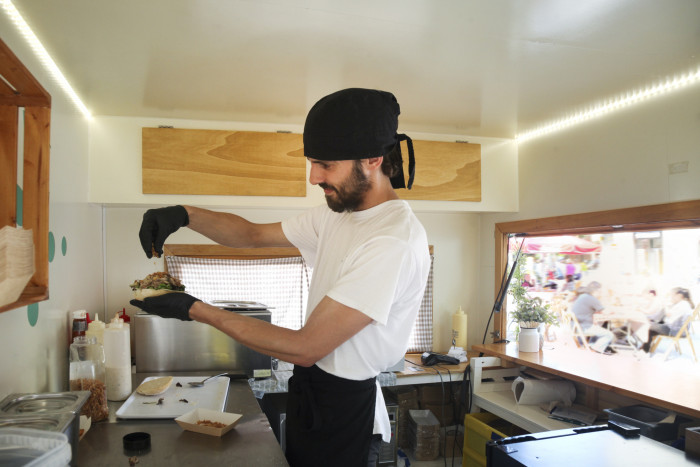Cook
Ringawera
Alternative titles for this job
Cooks prepare, cook and serve food. They work in cafes, bars, hospitals, schools, daycare centres, fast food outlets, or for caterers.
Pay
Cooks usually earn
$25-$27 per hour
Source: Restaurant Association, 2023.
Job opportunities
Pay
Pay for cooks varies depending on experience and where they work.
- Cooks usually earn between $25 and $27 an hour.
Source: Restaurant Association of New Zealand, '2023 Hospitality Industry Remuneration Survey', 2023.
- Restaurant Association website - 2023 Hospitality Industry Remuneration Survey
- PAYE.net.nz website - use this calculator to convert pay and salary information
- Employment New Zealand website - information about minimum wage rates
(This information is a guide only. Find out more about the sources of our pay information)
What you will do
Cooks may do some or all of the following:
- prepare raw ingredients
- cook food quickly and efficiently
- arrange food on plates or wrap takeaways
- give instructions and demonstrate cooking methods to others
- create new recipes and plan menus
- order food supplies, organise deliveries and restock shelves
- run their own business.
Skills and knowledge
Cooks need to have:
- food preparation and cooking skills
- the ability to follow recipes and instructions
- knowledge of food hygiene, stock rotation and food storage methods
- an understanding of food allergens
- knowledge of how a commercial kitchen works.
Cooks who run their own business also need business skills.
Working conditions
Cooks:
- may work long hours and shift work that includes early mornings, evenings and weekends
- work in commercial kitchens, takeaway shops, and kitchens in organisations
- work in environments that may be hot, noisy and stressful.
Entry requirements
There are no specific requirements to become a cook as you gain skills on the job.
However, cookery or food-handling qualifications may be useful. These include:
- food hygiene courses
- foundation cookery courses
- cookery apprenticeships
- two-year professional cookery courses.
- ServiceIQ website - cookery apprenticeships and courses
- More information about apprenticeships
Secondary education
There are no specific secondary education requirements to become a cook. However, home economics (food and nutrition), English and maths to at least NCEA Level 1 are useful.
Personal requirements
Cooks need to be:
- reliable
- quick and efficient, while still being careful
- adaptable and creative
- accurate, with a good eye for detail
- able to work well under pressure and in high-stress environments
- strong communicators
- able to work well in a team.
Useful experience
Useful experience for cooks includes:
- restaurant work
- any work involving preparing food for others
- work in a catering or food business
- work in the aged care industry.
Physical requirements
Cooks need to:
- have a high level of personal hygiene
- have good hand-eye co-ordination as they handle sharp knives and other kitchen tools
- be reasonably fit as they spend long periods on their feet.
Find out more about training
- Hospitality New Zealand
- 0800 500 503 - www.hospitality.org.nz
- Restaurant Association of New Zealand
- 0800 737 827 - info@restaurantnz.co.nz - www.restaurantnz.co.nz
- ServiceIQ
- 0800 863 693 - intel@serviceiq.org.nz - www.serviceiq.org.nz
What are the chances of getting a job?
Cook vacancies common
Chances of getting a job as a cook are good because:
- the increasing number of cafes, takeaway bars, early childhood centres and retirement villages means more kitchen staff are needed
- people tend to stay in the job for short periods only, due to low pay, which creates vacancies
- employers are struggling to get skilled staff, so may offer more training to inexperienced staff.
The hospitality industry in New Zealand is large, employing about 130,000 people.
According to the Census, 2,613 cooks worked in New Zealand in 2018.
Types of employers varied
Cooks work in a range of eateries that tend to specialise in fast food. These include:
- cafes
- bars and pubs
- fast food outlets
- small restaurants, grills and bistros.
Cooks also work in kitchens at:
- rest homes
- retirement villages
- hospitals
- early childhood centres
- schools
- universities
- private companies.
Sources
- Business New Zealand, 'The Future of Childcare Centres in NZ', accessed January 2018, (www.waterfordpress.co.nz).
- Harris, C, 'Shortage of Retail and Restaurant Workers Becoming Acute', 19 February 2017, (www.stuff.co.nz).
- Lines-MacKenzie, J, 'Subsidies and Work Pressure Fuel Childcare Growth', 27 August 2018, (www.stuff.co.nz).
- Restaurant Association of New Zealand, '2018 Hospitality Report', accessed January 2019, (www.scoop.co.nz).
- Stats NZ, '2018 Census Data', 2019.
- Village Guide, 'Is the Retirement Village Industry About to Employ More People Than Real Estate?' (media release), 5 October 2018, (www.villageguide.co.nz).
(This information is a guide only. Find out more about the sources of our job opportunities information)
Progression and specialisations
Cooks may move into supervisory or managerial roles, or more senior chef positions.
They may also set up their own businesses, such as cafes or takeaway shops.
Last updated 27 March 2025

